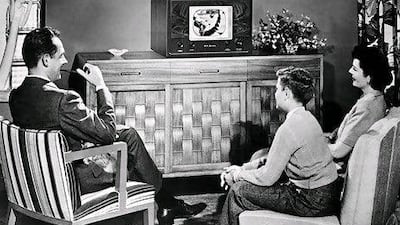The past half century has been the age of electronic mass media. Television has reshaped society in every corner of the world. Now an explosion of new media devices is joining the TV set: DVDs, computers, game boxes, smartphones, and more. A growing body of evidence suggests that this media proliferation has countless ill effects.
The US led the world into the television age, and the implications can be seen most directly in America's long love affair with what Harlan Ellison memorably called "the glass teat". In 1950, fewer than 8 per cent of American households owned TV sets; by 1960, 90 per cent had them. That level of penetration took decades longer to achieve elsewhere. The poorest countries are still not there.
Americans became the greatest TV watchers, which is probably still true today, even though the data is somewhat sketchy and incomplete. The best evidence suggests that Americans watch more than five hours per day of television on average - a staggering amount, given that several hours more are spent in front of other video-streaming devices. Other countries log far fewer viewing hours. In Scandinavia, time spent watching television is roughly half the US average.
The consequences for American society are profound, troubling, and a warning to the world - although it probably comes far too late to be heeded. First, heavy television viewing brings little pleasure. Many surveys show that it is almost like an addiction, with a short-term benefit leading to long-term unhappiness and remorse. Such viewers say that they would prefer to watch less than they do.
Moreover, heavy television viewing has contributed to social fragmentation. Time that used to be spent with others in the community is now spent alone in front of the screen. Robert Putnam, the leading scholar of America's declining sense of community, has found that television viewing is the central explanation of the decline of "social capital", the trust that binds communities together. Americans simply trust each other less than they did a generation ago. Of course, many other factors are at work, but television-driven social atomisation should not be understated.
Certainly, heavy television viewing is bad for one's physical and mental health. Americans are high in world obesity rankings, with roughly two-thirds of the US population now overweight. Again, many factors underlie this, including a diet of unhealthy fried foods, but the sedentary time spent in front of the TV is an important influence.
At the same time, what happens mentally is as important as what happens physically. Television and related media have been the greatest purveyors and conveyors of corporate and political propaganda in society.
America's television ownership is almost entirely in private hands, and owners make much of their money through relentless advertising. Effective advertising campaigns, appealing to unconscious urges - typically related to food, sex and status - create cravings for products and purchases that have little real value for consumers or society.
The same, of course, has happened to politics. American politicians are now brand names, packaged like breakfast cereal. Anybody - and any idea - can be sold with a bright ribbon and a catchy jingle.
All roads to power in America lead through television, and all access to television depends on big money. This logic has put American politics in the hands of the rich as never before.
Even war can be rolled out as a new product. The Bush administration promoted the premises of the Iraq war - Saddam Hussein's non-existent weapons of mass destruction - in the familiar colourful, fast-paced, and graphics-heavy style of television advertising. Then the war itself began with the so-called "shock and awe" bombing of Baghdad - a made-for-TV live spectacle.
Many neuroscientists believe that the mental-health effects of television viewing might run even deeper than addiction, consumerism, loss of social trust, and political propaganda. Perhaps television is rewiring heavy viewers' brains and impairing their cognitive capacities. The American Academy of Pediatrics recently warned that television viewing by young children is dangerous for their brain development, and it called on parents to keep children under age two away from the TV and similar media.
A recent survey in the US by the organisation Common Sense Media reveals a paradox, but one that is perfectly understandable. Children in poor American households today not only watch more TV than children in wealthy households but are also more likely to have television sets in their rooms.
To be sure, the mass media can be useful as providers of information, education, entertainment, and even political awareness. But too much of it is confronting us with dangers that we need to avoid.
At the very least, we can minimize those dangers. Successful approaches around the world include limits on television advertising, especially to young children; non-commercial, publicly-owned TV networks such as the BBC; and free (but limited) TV time for political campaigns.
Of course, the best defence is our own self-control. We can all leave the television off for more hours per day and spend that time reading, talking, and rebuilding the bases of personal health and social trust.
Jeffrey Sachs is a professor of economics and the director of the Earth Institute at Columbia University. He is alsospecialadviser to the United Nations secretary general on the Millennium Development Goals.
* Project Syndicate

